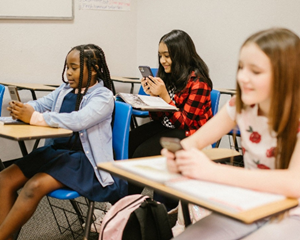By banning the use of smartphones in classrooms, the United Nations education, science and cultures agency is hoping it will improve learning,
联合国教育、科学与文化组织希望通过禁止在教室里使用智能手机来改善学生的学习状况,
with a new report saying evidence shows excessive cell phone use is linked to reduced educational performance.
一份新报告称,有证据表明过度使用手机与学习成绩下降有关。
UNESCO warns policy makers that even as they embrace digital technology, it should never take center stage over face-to-face teaching.
教科文组织警告政策制定者,即使他们接受数字技术,数字技术也不应该取代面对面的教学。
But the report says countries need to have clear objectives to make sure it is beneficial in education.
不过该报告也指出,各国需要有明确的目标,以确保数字技术对教育有益。
Sachin Maharaj at the University of Ottawa says countries need to consider the impact changes to technology can have.
渥太华大学的萨钦·马哈拉杰表示,世界各国需要考虑技术变化可能产生的影响。
"When it comes to phones and other technologies, what is sort of best for the the learning and mental well-being of kids in schools."
“当涉及到手机和其他技术时,要考虑到对学校里孩子的学习和心理健康最有益处的是什么。”

UNESCO acknowledges technology can provide an education lifeline to many,
联合国教科文组织承认,技术可以为许多人提供教育生命线,
but there can be barriers faced, especially among those from lower income households and countries.
但也可能会带来障碍,尤其是对来自低收入家庭和国家的人。
Part of this call for a blanket ban is also over cyberbullying concerns.
呼吁全面禁止在教室里使用手机的部分原因,也是出于对网络欺凌的担忧。
While 16 percent of countries have adopted legislation to prevent and act on it,
虽然16%的国家已经通过立法来预防和采取行动,
a 2019 international study found among most middle and high income countries, at least 10 percent of grade 4 students surveyed have experienced cyberbullying.
但是2019年的一项国际研究发现,在大多数中高收入国家,至少有10%的受访四年级学生经历过网络欺凌。



